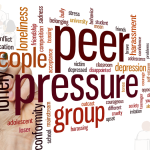Peer pressure is an uncontrolled influence among individuals of the same age group that persuades them to make choices alien to their values and norms. This phenomenon is particularly prevalent among Nigerian youth, fueled by societal emphasis on materialism and the pursuit of wealth at an early age. This societal pressure, sometimes even encouraged by parents, has contributed to a seemingly heightened pressure among Nigerian youth.
Table of Contents
Types of Peer Pressure
There are two major types: direct and indirect.
Direct peer pressure: This form involves direct influence, where one individual persuades another to make a decision they would not usually make. For instance, an SS3 student might convince her friend to wear a revealing outfit to a school party, directly exerting her influence.
Indirect peer pressure: Unlike direct peer pressure, this operates through observation and emulation. Individuals are influenced by the actions and behaviors of those around them or through constant exposure to media content that portrays certain lifestyles or ideals. This indirect influence can lead to imitation and a desire for acceptance and belonging.
Causes of Peer Pressure Among Nigerian Youth
-
Inferiority complex
Many youth with an inferiority complex are particularly vulnerable due to their deep-rooted feelings of inadequacy and low self-esteem. They may constantly compare themselves to their peers, perceiving themselves as lacking certain qualities or achievements. This internal struggle can make them desperate for external validation.
In an attempt to compensate for their perceived shortcomings, youth with an inferiority complex may adopt the opinions, interests, or even mannerisms of their peers, often engaging in behaviors that go against their values or beliefs.
Read also: How to boost your self-esteem and fight inferiority complex
-
Fear of bully
The fear of being bullied is another reason Nigerian youth yield to social pressure. When individuals fear being targeted, they are more likely to conform to the group, even if they disagree with the group’s actions. People often think going along with others will protect them from bullying.
People who are bullied might feel helpless and afraid to speak up because they’re worried it will lead to more bullying. This can make them succumb to the demands of their bullies, which means indulging in more risky behaviours.
-
Bad parenting
Inconsistent discipline, unrealistic expectations, and a lack of emotional support from parents can contribute to societal pressure on adolescents and children. Without a strong foundation of guidance and support at home, children may turn to their peers for acceptance and direction. They may also be more vulnerable due to a lack of self-confidence and a weaker sense of personal values.
Read also: How to consistently identify and uphold your personal values
-
Social acceptance
The natural human desire for social acceptance is a significant factor contributing to peer influence. During adolescence, when individuals are establishing their identity and self-worth, the need to belong to a group intensifies. Peer groups satisfy this need and provide a sense of identity and support, but the pressure to conform to group norms can lead to individuals making conflicting and unpleasant life choices.
Are you interested in honing your writing skills? Our community is the best platform for you. Join us here.
Benefits of Positive Peer Pressure Among Nigerian Youth
-
Encourages making healthy choices
When friends encourage each other to make healthy choices, such as eating nutritious foods, exercising regularly, and avoiding risky behaviors, it can lead to a healthier lifestyle for everyone involved. One way that peer pressure can promote healthy choices is by providing a sense of accountability. When individuals are surrounded by friends who are also committed to making healthy choices, they are more likely to stick to healthy habits.
-
Encourages setting positive goals
Peer pressure can be a powerful tool for setting positive goals. When surrounded by individuals who are motivated and driven towards achieving their objectives, it can create an environment that encourages and supports personal growth. This reduces the perceived difficulty or fear associated with goal setting, making individuals more likely to act on their dreams.
-
Engage in constructive activities and hobbies
Positive influence can impact individuals’ engagement in constructive activities and hobbies. When friends encourage each other to participate in enriching and beneficial activities, it can lead to a more fulfilling and well-rounded life for everyone involved. Also, when individuals feel connected to others who share their interests, they are more likely to continue pursuing those interests.
-
Develop strong self-esteem and confidence
Positive pressure can motivate individuals to step outside their comfort zones and try new things. For example, if a group of friends encourages each other to try public speaking, they may be more likely to try it because they know their friends are there to support them. This can help individuals develop new skills and overcome their fears, boosting their self-esteem and confidence.
Harmful Impacts of Peer Pressure
-
Experimenting with drugs and alcohol
Negative influence can impact individuals’ choices regarding drugs and alcohol. One major issue is it normalises these behaviors. When individuals see their peers using these substances without any immediate consequences, it seems okay to do the same. This can be especially true for adolescents, who are still developing their sense of right and wrong.
-
Engaging in risky sexual behaviors
One major consequence of succumbing to pressure is the possibility of engaging in risky sexual behaviors. Many Nigerian youth may find themselves making impulsive decisions that compromise their sexual health. The desperation for social approval can lead individuals to participate in activities without considering the potential consequences. This can result in unprotected sex, the neglect of contraceptive measures, and an elevated risk of sexually transmitted infections or unwanted pregnancies.
-
Involvement in criminal activity
In some groups, involvement in criminal activity can be seen as a badge of honor or a way to gain respect from others. Those who may not be inclined towards criminal behavior may feel pressured to participate to fit in and gain acceptance from their peers. By creating a sense of belonging and making it difficult to resist, negative pressure can significantly negatively impact individuals’ lives and lead them down a path of crime.
-
Development of low self-esteem and depression
When individuals are constantly criticised or belittled by their peers, it can make them question their value and worth. Also, it makes them see themselves negatively and feel less confident.
-
Indecent dressing
The desire to conform to a specific group’s style or adhere to prevailing trends can lead individuals to dress in a way that may not align with their values. This pressure can compromise one’s authenticity and self-expression. Individuals may find themselves wearing attire that doesn’t resonate with their genuine identity but is chosen to gain social approval or avoid rejection.
How to Manage Peer Pressure
-
Pause before you act
When you feel pressured, take a deep breath to calm your nerves, clear your head, and give yourself a moment to think before you act. It will help you gain some perspective and prevent impulsive decisions due to stress.
-
Don’t always respond immediately
Delaying a response allows you to detach from the immediate social pressure and gain a sense of control over your actions. By not reacting, you allow yourself to assess the situation rationally, consider the potential consequences, and weigh your options.
-
Self-reflect
Self-reflection fosters self-awareness and self-esteem. Understanding what matters provides you with a strong foundation for making decisions that align with your authentic self. When faced with peer pressure, refer to your values for guidance and make choices consistent with your integrity.
-
Choose your friends wisely
Surrounding yourself with positive and supportive individuals is crucial for navigating peer pressure and making healthy choices. Selecting friends who share similar values, respect your individuality, encourage personal growth, explore your interests, and develop your unique talents can significantly impact your vulnerability to social pressure.
Conclusion
In conclusion, pressure among Nigerian youth can either be good or bad, which makes it pretty complicated. By fostering a deeper understanding of its causes, effects, and potential solutions, emphasising cultivating resilience and individuality, you will be empowered to make choices aligned with your values and aspirations.
Follow us on Twitter for more tips on living healthy and positively. Also, check out our recent videos discussing lifestyle trends among Nigerian youth.
Edited by Halimat Chisom.
About Author
- Oyinade Afe is a versatile writer, designer, and filmmaker with a passion for telling stories. With more than 3 years of experience in content writing, she excels in crafting compelling narratives, visually stunning designs, and producing engaging films. Oyinade is dedicated to authenticity, creativity, and inspiring others through her work.
Latest entries
 LifestyleFebruary 7, 2024When to Consult a Financial Advisor to Manage Your Earnings
LifestyleFebruary 7, 2024When to Consult a Financial Advisor to Manage Your Earnings Business InsightsJanuary 8, 2024How to Conduct a User Interview for a Product: From Preparation to Execution
Business InsightsJanuary 8, 2024How to Conduct a User Interview for a Product: From Preparation to Execution
 LifestyleDecember 1, 2023Peer pressure Among Nigerian Youth: The Good and Bad
LifestyleDecember 1, 2023Peer pressure Among Nigerian Youth: The Good and Bad

